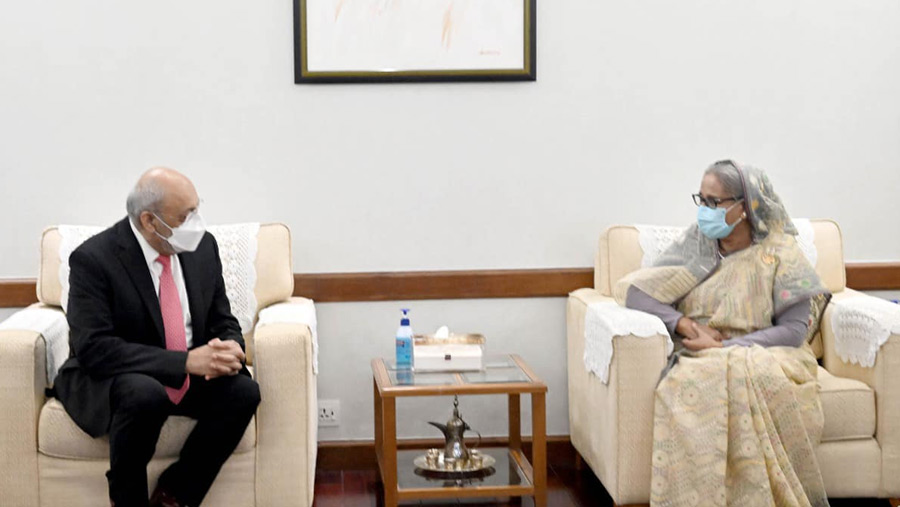


Prime Minister Sheikh Hasina on Saturday (Dec 3) sought cooperation from the World Heart Federation (WHF) to conduct research on basic medical science and build skilled manpower in the health sector.
"Help us conduct basic medical science research and give state-of-the-art training for our manpower's development," she said when President-elect of the WHF Prof Dr Jagat Narula paid a courtesy call on her at her official Ganabhaban residence in Dhaka in the morning.
PM's Speech Writer M Nazrul Islam briefed newsmen after the meeting, local media reported.
Describing basic research as vital for the overall development of the country, the prime minister said her government is laying greater importance on research of medical science for improving the healthcare sector.
Referring to the agri related researches being carried out during her government, she said Bangladesh has attained self-sufficiency in food production along with boosting milk, meat and fish production.
"Research is mainly behind Bangladesh's success in the agricultural sector, including attaining food autarky," she said.
Briefly describing her government measures for overall development of the health sector, the PM said her government's main target is to reach healthcare services to the people's doorsteps.
She said Father of the Nation Bangabandhu Sheikh Mujibur Rahman had planned to reach healthcare services to the grassroots level as he started setting up union healthcare centres across the country. But, he (Bangabandhu) could not finish his work as he was assassinated in 1975 along with most of the family members, the premier said.
Following the footsteps of the Father of the Nation, Sheikh Hasina said she mooted the plan and started setting up the community clinics during her 1996-2001 tenure. But the BNP alliance government in 2001 had stopped the community clinics project, she added.
However, assuming office in 2009, her government again started setting up of the community clinics, she said, adding now, over 18,000 community clinics and healthcare centres across the country are operating to make available healthcare services at people's doorsteps.
The PM said people are getting 30 types of medicines from the community centres free of cost as insolvent and poor diabetic patients are also getting free insulin.
She said her government has already established five medical universities in divisional headquarters to impart higher education and research in medical science, adding that they are mulling establishing medical universities in every division.
She also said many specialised hospitals have been built in public and private sectors at her government initiatives to treat heart, kidney and cancer patients, adding that they have a target to build specialized hospitals in every region.
The PM said Bangladesh has attained great success in the pharmaceutical sector as it is currently producing all the life-saving medicines and exporting those abroad.
WHF President-elect Jagat Narula heavily praised the health sector development of Bangladesh under the dynamic leadership of PM Sheikh Hasina describing the advancement as "impressive progress".
He said Bangladesh has plenty of talented physicians who need appropriate training and assistance to boost their efficiency.
"I am going to take over the charge of the World Heart Federation as its president in January next and have a target to work first with Bangladesh, India and Mongolia on heart diseases," he said.
Dr Narula stressed the need for making aware the mothers about the non-communicable diseases as it helps reach its benefit at grassroots quickly.
At the meeting it was informed that non-communicable diseases account for about 50 percent deaths in Bangladesh, of which heart diseases are responsible for 17 percent deaths.
Director of the National Institute of Cardiovascular Diseases Prof Mir Jamal Uddin informed the meeting that the PM has donated the institute Tk 7 crore from the PM's Relief and Welfare Fund to help procure valves, stents and pacemakers for poor and insolvent heart patients. As many as 300 valves, 450 stents and 250 pacemakers have so far been set up in the hearts of the patients, he said.
Prime Minister's Office Senior Secretary Md Tofazzel Hossain Miah, President of Bangladesh Society for Cardiovascular Intervention Prof Dr AKM Fazlur Rahman, renowned cardiologist and national professor Brig. (retd) Abdul Malik, Bangladeshi expatriate in USA Prof Chowdhury Hafiz Ahsan, Prof MG Azam and Prof Fazila-Tun-Nesa Malik, were present at the meeting.